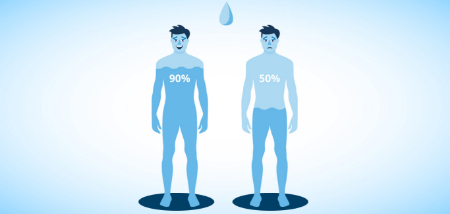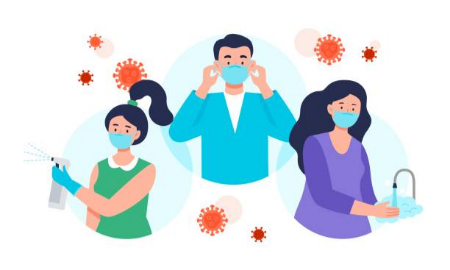Dehydration occurs when the body loses or uses more water than it absorbs. This causes the body to lack the fluids it needs to function. Without treatment, chronic dehydration can increase the risk of severe damage to vital body systems such as the brain, heart, and kidneys.
Despite trying to drink enough healthy water, other factors can increase your risk of dehydration. This can occur due to diarrhea, vomiting, fever, heavy sweating, or frequent urination. Also, if you have certain diseases that interfere with the way your body uses and stores fluids, you are more at risk of dehydration.
Symptoms of dehydration
Know the signs of dehydration so you can replace lost fluids or get medical attention before your condition worsens. Symptoms of dehydration include:
• Dark colored urine
• Dizziness
• Dry skin
• Extreme thirst
• Fatigue
• Frequent urination and sweating more than usual
• Dry mouth (xerostomia)
Diseases that can cause dehydration
1. Celiac disease
Celiac disease is a chronic autoimmune disease that damages your small intestine. The disease is caused when affected people eat foods that contain gluten, a protein found in wheat, barley, oats, and some other grains. Treatment involves following a gluten-free diet.
In celiac disease, gluten triggers an immune response that attacks the villi (tiny finger-like bumps that line your small intestine), which are responsible for nutrient absorption. Damage to the villi can increase the risk of malabsorption (inability to absorb minerals and vitamins from your food).
Diarrhea is a common symptom of malabsorption in celiac disease. Dehydration can occur as a complication of diarrhea because your body loses more fluid than you can absorb. In rare cases, people with celiac disease can develop diarrhea that can cause severe dehydration, weight loss, and metabolic disturbances in a condition called celiac crisis.
The symptoms of celiac disease can vary from person to person. You may have celiac disease but not have significant symptoms. When they occur, symptoms of celiac disease in adults can include:
• Abdominal pain
• Flatulence
• Chronic diarrhea
• Constipation
• Gas
• Lactose intolerance
• Loose, bulky, greasy and smelly stools
• Nausea
• Vomiting
2. Sjogren’s syndrome
Sjogren’s syndrome is a chronic autoimmune disorder that affects your entire body. While the disease can occur alone, about 50 percent of people with Sjögren’s syndrome have another autoimmune connective tissue disease, such as lupus, rheumatoid arthritis, or scleroderma.
Sjögren’s syndrome causes problems when your immune system attacks the glands and tissues that produce moisture. These areas include the salivary glands, which produce saliva, the lacrimal glands, which produce tears, and the mucous membranes, which produce mucus.
Sometimes, your immune system can attack other parts of the body, damaging organs and tissues. Dehydration can occur because the disease affects your body’s ability to regulate fluids and electrolytes (the minerals your body needs to balance water levels).
Other symptoms of Sjogren’s syndrome include:
• Dry cough
• Dry nasal passages and throat
• Dryness of airways
• Dryness of the digestive system
• Dry skin
• Dyspnea (shortness of breath)
• Fatigue
• Joint pain
• Muscle pain
• Muscle weakness
• Numbness or tingling in the hands or feet
• Skin rash
• Swelling of the glands around the face and neck
• Vaginal dryness
• Dry eye (xerophthalmia)
• Dry mouth (xerostomia)
3. Ulcerative colitis
Ulcerative colitis is an inflammatory bowel disease (IBD) that causes inflammation and ulcers (open sores) in the lining of your large intestine (colon and rectum). This usually occurs due to an overactive immune system. Inflammation caused by ulcerative colitis can prevent adequate absorption of water and electrolytes (magnesium, sodium, zinc, phosphorus, potassium) and cause dehydration. Your colon is responsible for absorbing water and electrolytes, and when it’s damaged, it can’t do that normally. Additional conditions common in ulcerative colitis, such as frequent, watery diarrhea, can also contribute to dehydration.
Other symptoms of ulcerative colitis can range from mild to severe. Many people have symptoms that are balanced by periods of remission (times when symptoms disappear). Symptoms can include:
• Abdominal cramps and pain
• Anemia (low number of red blood cells)
• Bloody stools
• Fatigue and low energy
• Fever
• Loose and urgent bowel movements
• Loss of appetite
• Nausea
• Persistent diarrhea
• Tenesmus (an urgent need to have bowel movements, even when the bowels are empty)
• Unwanted weight loss
4. Cystic fibrosis
Cystic fibrosis is a progressive genetic disease. In people with cystic fibrosis, mutations in a gene called cystic fibrosis membrane chloride ion conductance regulator (CFTR) damage the CFTR protein. When this protein is dysfunctional, it cannot transport chloride, a component of salt, to the cell surface. Without chloride to absorb water to the cell surface, the mucus in various organs becomes thick and sticky.
People with cystic fibrosis are at greater risk for dehydration because they lose more sodium (salt) from their bodies than the average person. When a person with CF is active in recreational activities, gets sick, or the weather is too hot, they lose more sodium (salt) from their body than the average person.
People with cystic fibrosis also have a thirst that is not quenched as efficiently as other people. Normally, salt levels in your blood increase when you sweat, causing thirst. However, when a lot of salt is lost, as occurs in cystic fibrosis, you may not feel thirsty even though you have lost a lot of fluid.
Other cystic fibrosis symptoms can occur as a result of the mucus becoming thick and sticky instead of thin and slippery. Thick mucus can clog your organs. This interferes with the normal functioning of the organs and leads to the following:
• Diabetes
• Diarrhea
• Difficulty breathing
• Fertility problems
• Frequent lung infections
• Malnutrition
• Pancreatic failure
• Permanent lung damage
• Unwanted weight loss
5. Crohn’s disease
Crohn’s disease is a chronic inflammatory bowel disease that affects the gastrointestinal (GI) tract. It can cause inflammation in any part of the digestive tract, but most commonly affects the small intestine and upper colon. Research suggests that Crohn’s disease may be an autoimmune disease, although the exact cause is unknown.
Diarrhea and vomiting associated with Crohn’s disease can lead to severe dehydration in some people. Dehydration in Crohn’s disease occurs when you lose more fluid than you can replace. Dehydration can be a life-threatening condition if left untreated.
Other symptoms of Crohn’s disease can include:
• Abdominal pain
• Anemia (low iron level)
• Flatulence
• Diarrhea with or without blood
• Fatigue
• Floating stools due to poor fat digestion
• Nausea and vomiting
• Weak appetite
• Unwanted weight loss
6. Diabetes
Diabetes is a chronic disease that interferes with your body’s ability to convert food into energy. When you eat, your body breaks down the food you eat into glucose, a type of sugar. When this sugar enters your bloodstream, your pancreas releases insulin, a hormone that pushes the sugar into your body’s cells to produce energy.
Diabetes can interfere with the production of enough insulin or the proper use of insulin. This leaves too much sugar in your bloodstream without reaching your cells. Diabetes can increase your risk of dehydration because your kidneys normally reabsorb blood sugar. However, the high blood sugar levels that occur with diabetes can stress your kidneys.
As a result, extra sugar enters your urine along with extra fluid, causing you to urinate more. Your body pulls fluid from your cells if you don’t drink enough to replace the extra fluid needed to flush out the extra sugar. Dehydration can occur by excreting more fluids than you take in.
Other symptoms of diabetes include:
• Blurred vision
• Constant hunger
• Dry skin
• Fatigue
• More frequent infections than usual
• Frequent urination, often at night
• Numbness or tingling in the hands or feet
Polydipsia (excessive thirst)
• Slow healing of wounds
• Unwanted weight loss
7. Postural orthostatic tachycardia syndrome (POTS)
POTS (postural orthostatic tachycardia syndrome) is a circulatory disorder. It is one of a group of conditions characterized by orthostatic intolerance, which causes tachycardia (increased heart rate) and a drop in blood pressure when moving from a sitting or lying position to a standing position. Problems occur because your body can’t control your blood pressure or heart rate after you stand up. You may not get enough blood to your brain for 10 minutes after standing up, causing dizziness and lightheadedness.
Dehydration can occur with POTS because the condition interferes with your ability to retain fluids. A common problem involves the kidney hormones aldosterone, angiotensin, and renin, which regulate sodium and fluid retention. When not enough fluid remains in your bloodstream, decreased blood volume contributes to POTS syndrome.
Other symptoms of POTS can include:
• Chest pain
• Coldness or pain in the limbs
• Drop in blood pressure while standing
• Dyspnea (shortness of breath)
• Intolerance of exercise
• Fatigue
• Headaches
• Fast heartbeat
• High levels of plasma noradrenaline when standing
• Hypovolemia (low blood volume) when standing
• Nausea
Perisyncope (lightheadedness)
• Red-purple color in the legs when standing, which disappears on returning to the lying position.
Syncope (fainting)
• Vibration
• Management of low sodium (hyponatremia)
8. Cancer
Cancer occurs when certain cells in your body mutate, grow uncontrollably, and spread to other parts of your body in a process called metastasis. This disease can start anywhere in your body. Cancer cells grow and multiply when they shouldn’t. Problems arise when these cells join together to form tumors or lumps, which can be benign (non-cancerous) or malignant (cancerous).
Your fluid needs can be affected by the type of cancer you have. For example, people with gastrointestinal cancers are at increased risk for dehydration, which can be caused by things like nausea, vomiting, diarrhea, or difficulty swallowing. Other symptoms of cancer can vary depending on the location of the cancer cells. Some common symptoms of cancer include:
• Abdominal pain
• Bladder changes or passing blood during urination
• Changes in normal bowel habits leading to constipation or diarrhea
• Fatigue
• Loss of appetite
• Nausea
• Swelling, lumps, thickening or other skin changes anywhere on your body
• Difficulty swallowing
• Unwanted weight loss
• Unusual bleeding or bruising for no reason
• Vomiting
9. Addison’s disease
Addison’s disease is a rare condition also known as primary adrenal insufficiency and hypocortisolism. With this disease, your adrenal glands do not produce enough of the hormones cortisol and sometimes aldosterone. Your adrenal glands are located just above your kidneys. The most common cause is autoimmune adrenalitis, a disorder in which your immune system attacks the cells of your own adrenal glands.
Addison’s disease and cortisol deficiency can interfere with your body’s ability to respond to stress and perform other normal life functions. Dehydration can occur as an early symptom of Addison’s disease. This is associated with insufficient levels of the hormone aldosterone, which regulates the salt and water balance in your body. Other symptoms of Addison’s disease include:
• Craving for salty foods
• Fatigue
• Frequent urination
• Increased thirst
• Irritability or low mood (mild depression)
• Lethargy (sleepiness or lack of energy or enthusiasm)
• Loss of appetite
• Muscle weakness
• Unwanted weight loss
10. Gastroenteritis
Gastroenteritis is a short-term disease caused by inflammation of the lining of the stomach and intestines. While often referred to as the “stomach flu,” gastroenteritis is not caused by influenza viruses. It can be caused by many different viruses, including noroviruses and rotaviruses. It can also be caused by consuming food or drink contaminated with viruses, bacteria, parasites, or chemicals, an illness called food poisoning.
While gastroenteritis is not harmful to most people, it can be dangerous if it leads to dehydration. Dehydration is the most common complication of gastroenteritis because it results from the loss of fluids and electrolytes that occurs with diarrhea and vomiting. In addition to dehydration, other symptoms of gastroenteritis include:
• Abdominal pain or cramping
• Nausea or vomiting
• Occasional fever
• Watery diarrhea
11. Hyperthyroidism
Hyperthyroidism is a disease characterized by an overactive thyroid gland. This leads to overproduction of thyroid hormones. It can speed up your body’s metabolism and processes. While this disease can give you extra energy, it will eventually lead to fatigue because your body is not designed to maintain normal function at such an accelerated pace.
Dehydration can be a complication of hyperthyroidism due to high body temperature, sweating and diarrhea. It can also occur as a symptom of thyroid storm, a rare but life-threatening condition that causes severe dehydration and heart problems. Other symptoms of hyperthyroidism include:
• Anxiety
• Fast heartbeat
• Increased appetite
• Irregular and/or rapid heartbeat
• Sleep problems
• Unwanted weight loss
12. Sepsis
Sepsis, also called blood poisoning, is your body’s severe response to an infection. It is a life-threatening medical emergency that damages vital organs and tissue. Sepsis requires immediate medical treatment. Dehydration with sepsis occurs due to external fluid loss through sweating. Sepsis also causes internal fluid loss due to reduced oral fluid intake, capillary leakage, and sepsis-induced vasodilation (dilation of blood vessels to increase blood flow to areas lacking nutrients or oxygen).
See your doctor right away if you or a family member experiences any of the following symptoms of sepsis:
• clammy or sweaty skin
• Confusion or disorientation
• Severe pain or discomfort
• Fever, chills, or feeling very cold
• Rapid heartbeat and breathing
• Shortness of breath

IV Treatments or Drinking Water: Which Treatment Is Best for You?
The best treatment for dehydration depends on the severity of the symptoms and the cause of the dehydration. Intravenous (IV) fluid replacement is commonly provided in hospitals to provide large amounts of fluids directly into the bloodstream of severely dehydrated patients.
While water can help replace fluids lost from dehydration, IV therapy can replace fluids more quickly and in greater amounts. IV therapy also offers the option of adding vitamins, minerals, and electrolytes that are missing, as well as medications, to help your body heal.
When necessary, IV treatments are prescribed by a doctor and given by a medical professional trained in inserting the IV and monitoring your response to treatment. This option may be particularly beneficial for populations such as older adults and those with chronic illness, who cannot replace lost fluids by drinking water alone.
If you have symptoms of dehydration, contact your doctor for advice on rehydration and other treatments. Dehydration from an acute or chronic illness may require other medical treatments to compensate for complications and promote recovery.
Frequently asked questions about diseases that can cause dehydration
1. Can dehydration cause serious complications?
Yes, severe dehydration can lead to serious complications such as kidney failure, shock, seizures, and even death.
2. How can dehydration be treated?
Dehydration treatment depends on its severity. In mild cases, drinking water and fluids with electrolytes is enough. In severe cases, serum therapy may be required in the hospital.
3. When should you see a doctor?
If you experience symptoms of severe dehydration, such as confusion, seizures, or the inability to drink fluids, you should see a doctor immediately.
4. What factors besides diseases can cause dehydration?
In addition to diseases, factors such as intense exercise, hot weather, taking some medications, etc. can also cause dehydration.
5. Is dehydration more dangerous in children and the elderly? why
Yes, because of the faster metabolism of children and the reduced function of some organs in the elderly, they are more at risk of dehydration.
summary
Dehydration occurs when your body loses or uses more water than you take in. Without proper water levels, your body cannot function normally. While mild cases of dehydration can be reversed with adequate water intake, severe cases can threaten your health and well-being without medical treatment. You can prevent dehydration by replacing fluids with drinks and food. Watch for early signs of the problem, such as dry mouth, dizziness, and fatigue, so you can avoid severe effects on your body systems. Certain health conditions can increase the risk of dehydration, even with drinking adequate amounts of water. Know the signs of dehydration so that you can contact your doctor for proper treatment if a problem occurs.










